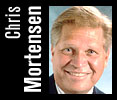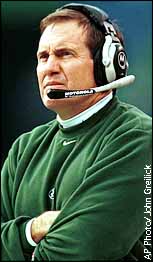
| ||||||||||||
| ALSO SEE Belichick stuns Jets, resigns as coach Parcells resigns; Belichick turns down Jets job Broncos offensive coordinator Kubiak cool to Patriots | ||||
| ESPN.com NFL | ||||
 | Wednesday, January 5 Making cents of Jets-gate Special to ESPN.com | |||
Remember the scene in "All The President's Men" when Bob Woodward (Robert Redford) meets with Deep Throat (Hal Holbrook) in a parking lot deck, pleading for information because the Washington Post reporter had seemingly hit a wall in pursuit of the Watergate story? Deep Throat pushed him down the groundbreaking path when he advised Woodward to "follow the money."
 | |
| Bill Belichick plans to fight for the chance to determine his own career path. |
Start with Bill Belichick's request for an expedited grievance hearing with the NFL. The league office was awaiting paperwork from Belichick's attorney, Neil Cornrich, to understand Belichick's claims for disengaging himself as the new head coach of the New York Jets.
One of the key elements to this claim will pertain to the $1 million bonus Belichick received from the late Jets owner Leon Hess last February, shortly after the New Yorkers fell short of a stunning Super Bowl run by losing to the Denver Broncos in the AFC title game.
What did the $1 million represent to Hess? The Jets will claim that it was a bonus to keep Belichick from taking a head-coaching job with another team. That would maintain Belichick's contractual arrangement with Hess that he would succeed Bill Parcells in New York.
Belichick apparently will claim that the $1 million was a generous bonus for his work as defensive coordinator that provided Hess with one of his most joyful seasons as an NFL owner.
Another ambiguous argument could be made by Belichick: The $1 million bonus was designed only to prevent Belichick from moving to another team after the 1998 season, not the '99 season.
Either way, Belichick got the money. He's not a spendthrift. That chunk of cash provides him with further financial flexibility to adapt his dangerous position that he won't coach, if necessary, if he can't control his own destiny.
A league executive says that the bonus means Belichick "won't get a lot of sympathy from this office." Any evidence that Belichick presents in his grievance had better be pretty compelling for NFL commissioner Paul Tagliabue to become a broker that would free the coach from his contractual obligation.
Belichick also will argue that the dynamics have changed dramatically since he last agreed to the arrangement to succeed Parcells. Most notably, Hess died and the club is in the final stages of sale to a new owner, either Charles Dolan or Robert "Woody" Johnson.
Belichick's point that the dynamics have changed is very legitimate. Jets president Steve Gutman claims Belichick's contract specifically addresses all elements of authority. But is that really any good, except to guarantee Belichick that he'd be paid off if the new owners wanted to change the structure of the organization a year from now? Didn't new Redskins owner Dan Snyder say he was going to retain GM Charley Casserly for a year, only to dismiss him after a few months?
More relative is what happened to Parcells in New England. He was in charge of the football operations when James Orthwein Busch owned the team. Busch sold to Robert Kraft. Parcells remained in charge until Kraft decided to alter the chain of command, with Bobby Grier making critical personnel decisions.
Sources close to Belichick say that his wife, Debby, had experienced the stress of an unstable franchise when Art Modell left Cleveland while her husband was coach. The sources say she does not want to endure the same uncertainty. Belichick is a devoted family man.
One item that might get Tagliabue's attention is whether the Jets violated the league's tampering policy. Under the policy, the Jets might tag two supervisors, one on each side of the football, to prevent those assistant coaches from making a lateral move. Parcells tagged offensive coordinator Charlie Weis and linebacker coach Al Groh on defense, leaving Belichick free.
But Belichick's contract -- if manipulated properly by the Jets -- in effect gave the Jets an extra coach to prevent from moving to another club. Is it or isn't a violation? There's no question that by Parcells and Gutman acting swiftly Monday morning that Belichick was blocked from discussing a job with another team, in this case the New England Patriots.
The next item under the "follow-the-money" rule is the fate of Parcells. Jets sources say that, out of respect for Hess, Parcells will not simply abandon the ship. He might not be happy with this idea, but Parcells could probably be enticed into coaching one more year if the new Jets owner would give him continued autonomy and, presto, more money.
Parcells made an estimated $2.4 million in base salary (although he might pull in another $1 million) to coach the Jets. Mike Holmgren now makes $4 million in Seattle. Holmgren is one of the league's greatest coaches, but is there anybody better than Parcells? Not unless it's Mike Shanahan in Denver.
So it just might be in the new owner's best interest to entice Parcells by making him the first $5 million coach. Or, maybe just to make sure there's no hesitation, how about $6 million to coach one more year, take one last Super Bowl shot, and make the transition in 2001 where maybe one of the current assistants -- Weis or Groh -- becomes the new Belichick?
One thing's for certain, and almost laughable if it didn't impact so many families -- the man with the most leverage at this junction is Parcells.
That is something that surely does not amuse Belichick, who took enough shots at Parcells in his press conference Monday to tell you he has never appreciated Parcells' fragile career personality that affected everyone who worked with the coach.
Belichick pointed out that he has been part of the Parcells roller coaster since 1987. It was after the 1986 season, in which Parcells won his first Super Bowl with the Giants, that he tried to leave New York to take a GMcoach role with the Atlanta Falcons. Commissioner Pete Rozelle ruled then that Parcells could not break free of his deal with the Giants.
Parcells ultimately left the Giants, went to TV, joined the Patriots, left for New York, etc. He has always been a master manipulator, a street-smart guy, who has sought and controlled much of his destiny and leverage.
Belichick and other staff members have often been subject to the uncertainty of Parcells' on-again, off-again career.
On Monday, Parcells stripped Belichick of the same latitude and control that he himself has sought and enjoyed. Certainly, Parcells was acting out of his spite for Kraft. Parcells may dislike Belichick for even considering a working relationship with the man.
Parcells and Belichick were never buddies, but respected colleagues. In other words, they are not Jimmy Johnson and Dave Wannstedt, who are truly best friends.
Now, Parcells and Belichick are not speaking with each other. All the money in the world might not change that.
Chris Mortensen, ESPN's lead NFL reporter, writes a weekly column for ESPN.com that appears each Wednesday. He also chats with ESPN.com users every Wednesday at 8 p.m. ET.
|
ESPN INSIDER
Copyright 1995-99 ESPN/Starwave Partners d/b/a ESPN Internet Ventures. All rights reserved. Do not duplicate or redistribute in any form. ESPN.com Privacy Policy. Use of this site signifies your agreement to the Terms of Service. | ||||